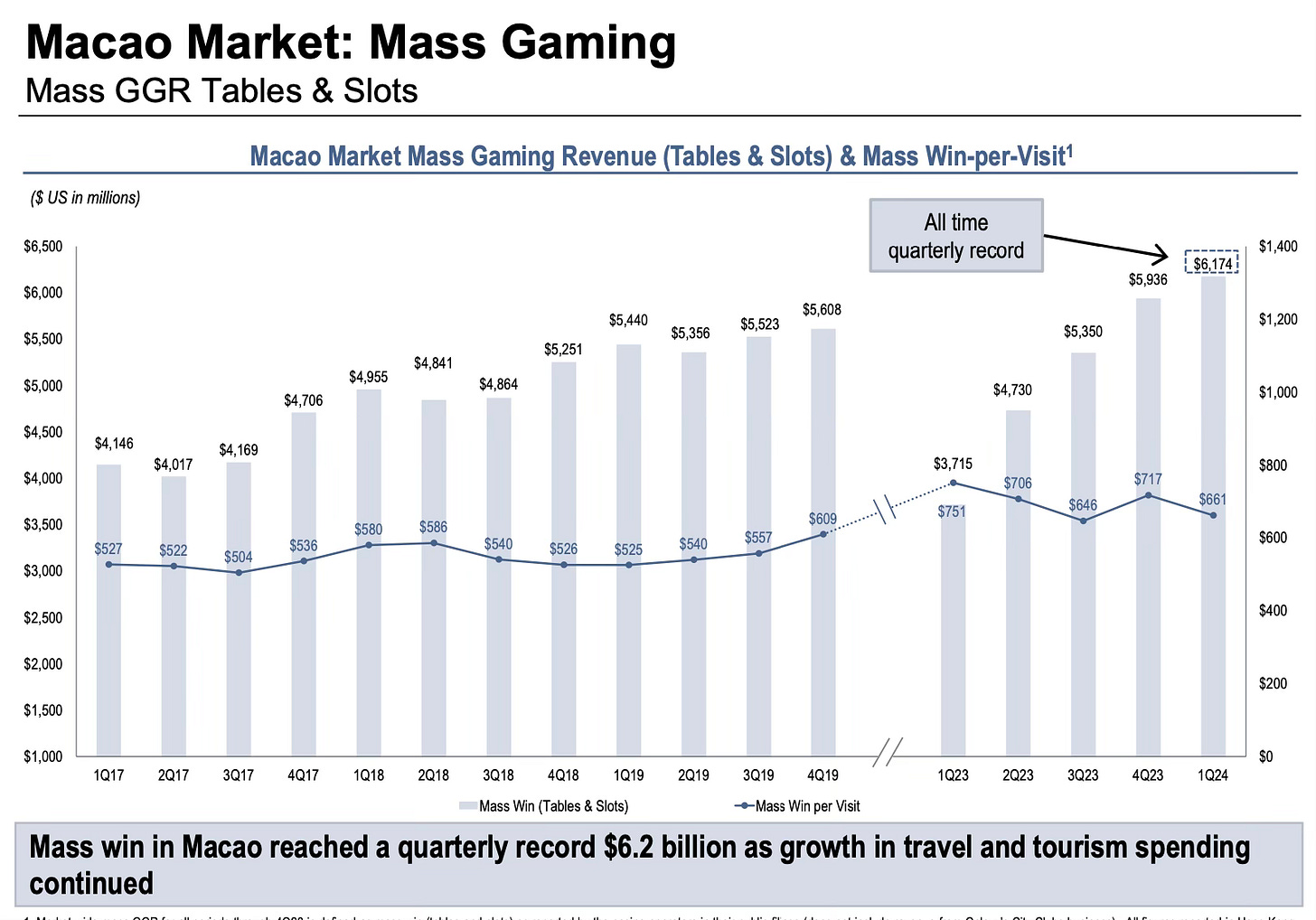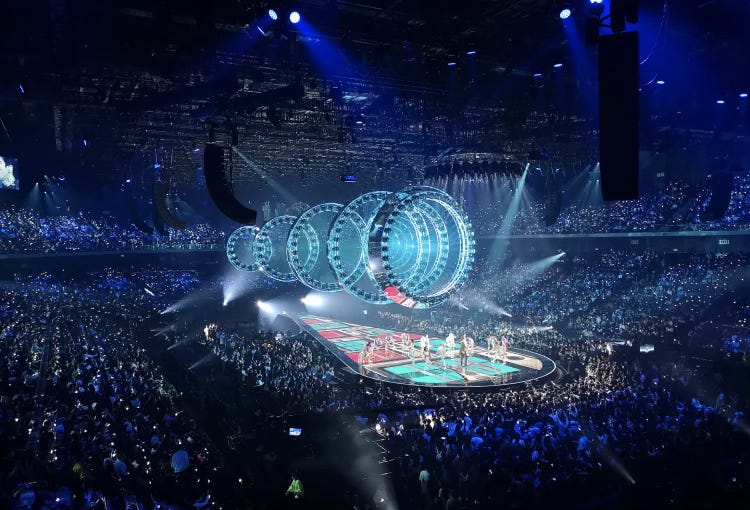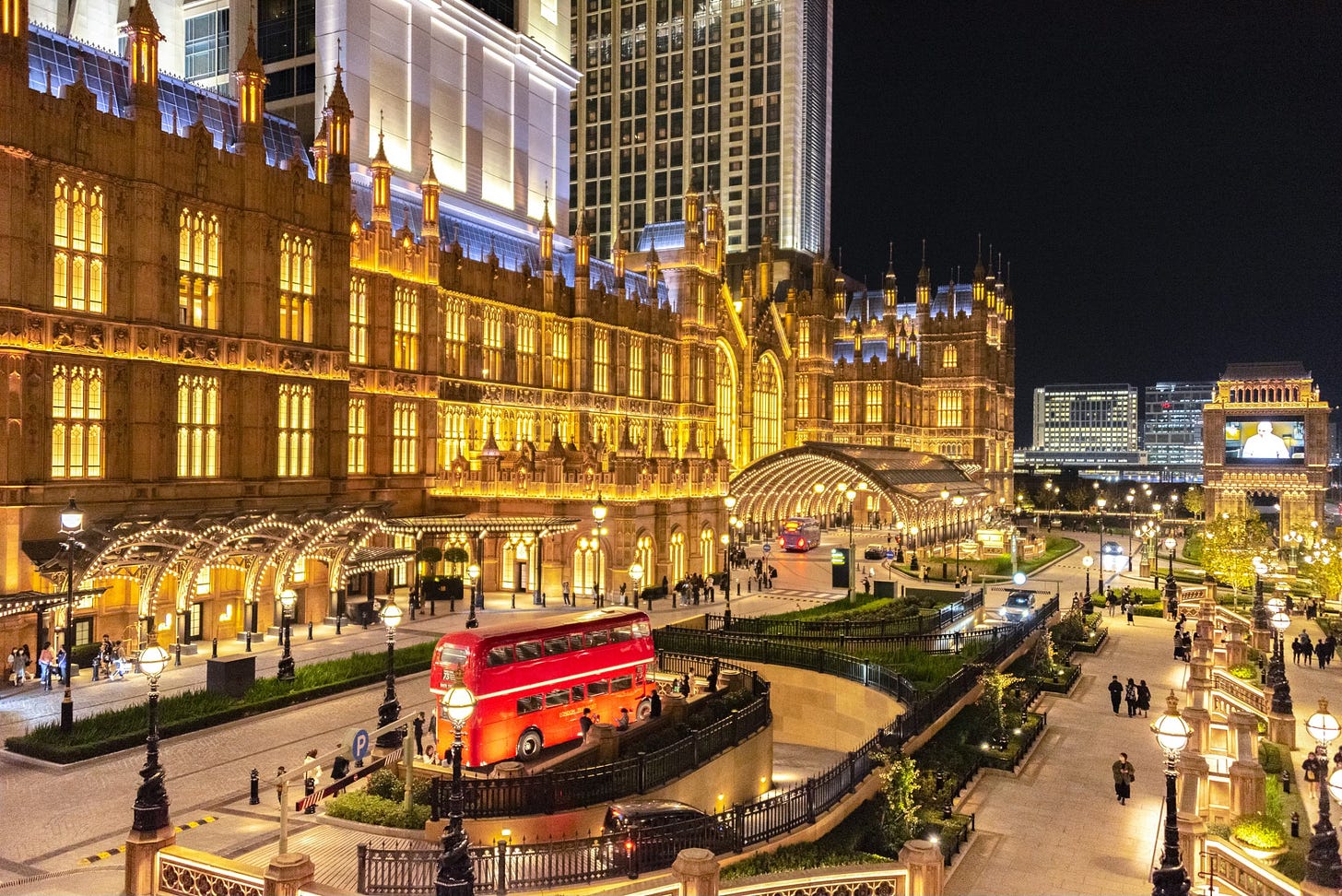YWR: The China Opportunity according to LVS
Disclosure: These are personal views, not investment recommendations to buy or sell a security. For investment advice seek professional help.
Mr YWR. Excuse me. Mr. Goldstein is still finishing up a call. He asks if you can be patient a few more minutes and then he’ll be ready to see you.
That’s fine. Thanks.
It was late afternoon and I went back to staring out the window at their nice view of the Las Vegas skyline. I always liked the dramatic look of the desert mountains in the background.
I started to daydream. I thought back to when I’d first heard former CEO Sheldon Adelson express his vision of the gaming market in Asia at a JPM gaming conference in 2008. Sheldon envisioned a Chinese gaming market that could be even bigger than Las Vegas. China’s version of the Las Vegas strip would be the Cotai Strip. At the time Las Vegas Sands had already recreated his famous Las Vegas Venetian hotel in Cotai and was planning more hotels. His vision was bold and interested me enough that I made a trip to see the Cotai Strip for myself in 2009.
It had been a drizzly, grey morning. Looking out my hotel window at Mandarin Oriental Macau window I couldn’t tell if the grey was just from the rain or partly from pollution.
I put my jacket on and went down to the lobby to have a slightly weird conversation with the concierge. I hoped he would understand my request.
How can I help you sir?
I was wondering if you could help me hire a taxi to drive me around Cotai. I want the taxi to drive around in a loop and then take me back to the hotel. I want to see all the casinos under construction.
You want to go to Cotai? But you don’t want to stop anywhere? And then you want to come back to the hotel? May I ask why?
Yes. I know it sounds strange, but I work for an investment firm and I would like to see the casinos under construction.
The concierge then had a rather long conversation in Chinese with one of the taxi drivers who had pulled up. I could see the concierge was trying to explain this slightly odd request. Maybe they were deciding where they would take me. Cotai was mostly a construction zone at this point.
Eventually, after a bit of back and forth the taxi driver understood the plan and we set off on our tour.
He didn’t speak English and I didn’t speak Chinese so the two of us sat mostly in silence as we drove down to the bottom of Cotai and back in a loop. We saw the border post over to the mainland. We saw the two completed casinos (Venetian and Glaxay) and the sites where more were planned. Other than the two casinos most of Cotai was mud and grass. The rain made it look a bit depressing.
Now that muddy island is doing $28bn/year in gaming revenues compared with $15bn/year for Las Vegas. And pre-COVID had been running at close to 40 million visitors/year. Similar to Las Vegas. Sheldon had been right. I need to be able to have imagination like Sheldon I thought to myself.
The clacking of her high heals on the stone floor woke me from my daydream.
Mr. Goldstein will see you know. Please come this way.
I followed her into Robert’s office. His office also had a beautiful view of the city. We sat down on an arrangement of couches which seemed too big. I asked for a strong coffee with some milk.
Robert Goldstein CEO of LVS: So Erik. Thank you for visiting us and taking an interest in LVS. If you’ll excuse me for asking I don’t think I understand which fund you work for.
Erik: Yes, thank you. Technically, I don’t work for a fund. I write a blog on Substack called YWR. But my readers and I are all interested in your shares. I/we think the market might be underestimating the earnings upside from what you are building in Macau and Singapore, especially Macau. I was especially interested in your Q1 earnings call. And that is why I/we wanted to meet.
Robert: We agree our shares are undervalued. That’s why we’re buying them back as fast as we can, as well as can increasing our stake in Sands China (1928 HK). But, what was so interesting about the call? I thought investors were upset. Our shares were -9% on the day.
Erik: Yes, investors were upset, but I kind of saw it the other way. I’ll tell you what I see.
Institutional investors have given up on China. They think it is structurally broken and will continue to suffer for years from all the problems; the property crisis, Xi getting super communist and ruining the economy, constant threats to invade Taiwan, and foreign businesses moving to India or Mexico. Right? You know the spiel.
But in the midst of the China negativity I see you guys doing the opposite. I see you preparing your casinos for a tidal wave of demand. First, you sold your Las Vegas casinos to Apollo to reinvest more into Asia. Now, I see you taking this opportunity while the Chinese gaming market is still soft to do every bit of renovation you can to get ready for the full surge in 2025. You are willing to take some pain right now with renovations like putting an extra $200mn into the Cotai Arena because you what to be at maximum minting potential as the demand ramps up again. And I think that view is so the complete opposite of what everyone is expecting from China that my readers have to hear it. And what makes it more credible is that it’s coming from a management team in Las Vegas, not a political propaganda mouthpiece.
And on a stock price basis, I think all the changes in the operations (Las Vegas divestments), disruptions from COVID, and weak Chinese economy make it hard for investors to see how much these properties can earn. And that is the opportunity. It’s why we wanted to meet with you today.
Robert: Erik… wow. I’m glad we are able to have this chat. I think I am going to subscribe to YWR. Now first on Macau. Yes, we have a strong vision on the growth of that market. The Macao market continues to grow as it has in each of the past five quarters. Since the reopening in early 2023, the annual run rate of the market has grown every quarter from $17 billion in Q1 of last year to $22 billion, then $24 billion and $26 billion, now reaching $28 billion in annualized gaming revenue.
We remain confident -- so fully confident in the future growth of the Macao market. I've said in the past, Macao market will grow to $30 billion and then $35 billion and then $40 billion beyond in the years ahead, I remain steadfast in our belief.
Erik: $40bn/year!!! So $10bn/quarter. That’s approaching what Vegas does in a year. Crikey.
Robert: And you are right on the renovations and disruptions we are going through right now.
We made a decision that if we take the arena offline and do it and make it one of the highest-quality arenas in Asia, then in the long run, we will benefit from the entertainment. And so we decided to do it as quickly as possible. And so that meant taking it offline in January this year and trying to get it done by October-November. Once we do that, we're going to have an incredibly high-quality arena with amenities that we've never had before. So it will make us more competitive in the market and drive additional high-quality tourism.
As you said we're doing it now. It is going to be disruptive. The worst is going to be across the summer when we have the lowest key count that we've had since we really opened because we're renovating the Londoner. And so it's going to be more of this disruption across the summer. But then hopefully, as keys come back online across the phasing, and as we get the arena back, let's call it October-November, we'll have a much more powerful set of assets to drive tourism and create cash flow. So there will be disruption. I can't quantify it for you, but it's not going to be immaterial.
I believe once the Londoner renovation is done, Erik, we'll have the one and two -- number one and two assets in Macau, by far. That really gives us a unique positioning for '25 and the years ahead to dominate the market in terms of the largest resorts and those proper resorts, both one and two.
Erik: It’s interesting to hear your optimism about the Londoner. It’s a big property, but the margins are quite low right now. I’ve thought it could be a big swing factor if Macau volumes pick up.
Rob: The Londoner has the opportunity to bring a lot of high-value tourism, but right now we're carrying the expense base without the revenue, right? So the margins naturally are not going to look right. So as the revenue comes in and as the visitation comes in, as the patrons come in, as the hotel is completed, and as the rest of the amenities are done, that will look more normal. The only problem is it's in '25. So we have a little bit of time that we have to get through with this investment.
Erik: I’ve said before it’s quite unique that you have so many properties in one market. No one else has that. I was thinking you could offer reward points which can be used across all of your properties and create network effects.
Rob: I like to call it an ecosystem and it’s why we are especially excited about Macau. If you haven't been to Macau and you haven't seen what we've done, I would encourage you to do it. It's not simply one thing. It's not simply hospitality. It's not simply gaming. It's not simply retail. It's an ecosystem that allows our customers to travel around all of our assets and have an experience they can't get anyplace else. And that's really what we have on offer and it's unique, and it's been invested in and it will continue to get better.
Erik: Can we switch to Singapore? Because the Marina Bay Sands (MBS) earnings are insane. You made over $500mn in EBITDA in Q1 from that property.
I remember back in 2009 when you were still building Marina Bay Sands. At the time I was on a trading desk where we were all wondering if MBS could possibly make $800mn in EBITDA when it was complete. Then I think a sell side analyst came out with a report that maybe it could make $1 billion, which seemed unimaginable at the time. Now here we are in 2024 and you are on a run rate for $2.2bn in EBITDA.
Was there something special in Q1? Was it the Taylor Swift concert?
Can you keep making $500mn/Q from MBS or is this peak demand?
Robert: The first thing you should note is that the building is still under renovation so $500 million a quarter annualized is very durable and more.
And the growth in Singapore as a desirable destination is soaring. It's not just Taylor Swift. It's Bruno Mars. It's the Hamilton show. It's endless events, F1. It's a juggernaut. And really, it's become accelerated.
This market has become very special in a very short order. And I think that's attributed to government there and the programs happening, entertainment, et cetera. So Singapore is highly desirable, and yes, that's very sustainable. And as good as Taylor Swift was, there's a lot more in the pipeline that will make that continue.
The key thing for us is we have a very strong view of the future success of Singapore. So strong that we're investing a couple of billion dollars in this property and we're looking to do IR2 as quickly as we can. We think this market is benefiting from a lot of the factors that make Singapore, great infrastructure, strong, stable government, great investment, great policy.
If you look at the wealth creation going around in Southeast Asia, it's pretty substantial. The last four years, even during the pandemic and they're pretty meaningful. And there are a lot of customers that are new to Singapore, new to Marina Bay Sands, and they're affluent and very successful, and they want to consume and they want to take advantage of the Singapore -- things Singapore has on offer. And so we feel very strongly about the future visitation in Singapore.
And peak of demand? We don't really see it. What we see is a supply constraint, right? When you look at who is trying to come to Singapore and the activities that are going on, we feel very strongly about future investment.
Erik: Singapore is supply constrained? It could make more?
Robert: We wish we had more exposure to Singapore that's why we're building more product. This is a very, very special place that people gravitate to, but you only have so many rooms, only have so many slot machines, and that is why we are building phase 2.
Erik: Robert, that is great. Thank you. I know it’s getting late in the day and you probably want to get home.
Robert: I’m glad you came. And please tell your readers we appreciate their interest. On your way out please tell Stephanie how we can get signed up for YWR. Thank you.
Post-Game
I think it’s interesting LVS dropped to $45 last week because of the disruptions from renovating the Londoner and the Cotai Arena.
I’ve modelled out how the earnings can progress as Macau revenue increase, and the casino margins expand (the Londoner especially).







